|
|
VetWorld News
Interesting snippets from the veterinary press - results
of surveys, research or just gossip!
|
Canine Seasonal Illness
This is a new disease seen in the last 3 years.
Typically a dog becomes
very ill within 24 hours of walking in woodland -
profound sickness,
diarrhoea, shivering and lethargy and often having a
fever. Most of the
cases have occurred after walks in Clumber Park,
Thetford and Sherwood
Forests. Although some cases have been fatal, most cases
recover with
appropriate early supportive treatment. The University
Of Nottingham is
currently doing research to try and establish the cause
of this
disease.
The good news is that we haven't seen a
case to date, here at
Churnet Valley Vets - and hope not to!
For more information on this new disease look here:
http://www.vpisuk.co.uk/portal/LinkClick.aspx?fileticket=LPddNIhs0i0%3d&tabid=149
|
|
Murder or Manslaughter? This week a
68-year-old pensioner admitted a charge of causing
unnecessary suffering to a cat. He had shot the cat with
an airgun, and it died the following morning. Mr Reeves
was ordered to do 100 hours unpaid work and pay £400
costs.
On first reading, the perpetrator may sound like a
violent, animal-hating villain. But when you read the
details of the case, there are some mitigating factors.
The pensioner is a bird lover who takes pleasure from
watching the birds in his garden; he regularly leaves
out bird food to attract them. He had seen the cat
attacking “his” birds, had thought that it was a feral
cat with no owner, and had apparently “lost control”.
Afterwards, he showed remorse, and “was horrified by the
pain the cat suffered”.
Of course it’s utterly wrong to shoot a cat, and the
verdict and punishment of the court sends out this
message strongly. But many people – even cat owners –
resent the way that cats prey upon birds. All cat owners
are presented at some time with a 'present' from their
cats and it is difficult not to be annoyed by this.
It's not the cat's fault, they are predators by nature.
There are ways of preventing this mayhem if it offends
us:
The ultimate, of course, is to keep cats as
indoors-only pets, and many people find that this is the
best answer. Cats that live indoors can have fulfilled,
active lives; they live for longer too, because they’re
protected from outdoor hazards such as cars and other
animals.
If cats do venture outside, there are some devices for
limiting their ability to hunt, but many owners feel
that these are too restrictive. A better approach may be
to ensure that bird food is left out in places that are
designed to prevent cats from having access; there are
many ways of doing this.
And if your neighbours’ cats are bothering you, there
are various ways of keeping them out of your garden,
such as motion-detecting water squirters, fence-top
palisades, or even just a noisy terrier to bark at them
if they come close.
|
Drunk and Disorderly.... There’s a dog attack with a
difference in the news today:
the dog had been drinking strong lager. On a hot
July day, the Staffordshire Bull Terrier had been
thirsty after a walk, and its owner’s uncle had given
the animal some Stella Artois to drink, rather than
water. Shortly afterwards, when a ten year old boy
leaned over the garden fence to pet the dog, it bit him
badly in the face. In court, the owner admitted having a
dangerous dog and was ordered to keep it under control
by the court, but the sanction requested by the police –
euthanasia of the dog – was declined because of the
unusual circumstances.
The court’s decision was wise: a behavioural expert
had assessed the dog, and recommended that it should be
spared. The behaviourist is working with the owner and
dog to improve its training, and if there was ever to be
a second incident, there would be no question:
euthanasia would be carried out.
Young Conrad Caine can be seen
drunk and
disorderly on the streets of Leek most Saturday nights
Humans make a conscious decision to drink alcohol, so
they are clearly still liable for actions taken when
drunk. But if a dog is given alcohol by its owner, can
it still be said to be responsible? I don’t think so.
|
Even more evidence that pets are good for you...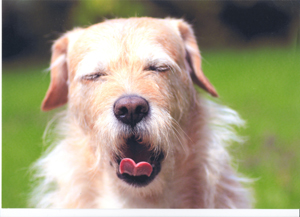
In a week where ex-laboratory chimpanzees were seen
hugging each other after seeing sunlight for the first
time in decades, there’s been further evidence that
humans and animals are closely connected at a basic,
instinctive level.
Research published in Nature Neuroscience describes
how scientists inserted electrodes directly into the
brains of patients who were being treated for epilepsy
using neurosurgery. They then presented the patients
with different pictures, and recorded the resulting
electrical activity in different parts of the brain.
The results were unexpectedly dramatic: cells in the
amygdala of the right side of the brain were aroused
more rapidly and powerfully when the patients were shown
pictures of animals compared to pictures of people,
landmarks and objects. The amygdala is the primitive
part of the brain that’s involved with emotional
learning, providing a rapid instinctive response to
threats or opportunities. The thinking part of our brain
– the cortex – modifies the reaction of the amygdala,
which is just as well: otherwise we’d run screaming from
the room whenever an aggressive animal popped up during
a television programme.
What does this discovery mean? Simply put,
humans are geared to react strongly and promptly to the
sight of animals.
Do you enjoy hobbies like pet-keeping and gardening?
Now you know why.
|
Kennel Club's Puppy Awareness Week September
2011
The Kennel Club has been meeting its critics head on by
promoting responsible puppy breeding and buying.
Last week was the Kennel Club's first Puppy Awareness
Week - they are trying to address the issue of
responsible dog ownership by encouraging people to buy
or adopt a puppy breed suitable for their lifestyle.
They are also addressing the problems of puppy
farming, a problem that is more common in the UK than
most people realise. Puppy farmers breed dogs
irresponsibly without regard for the health and
wellbeing of the puppies or the parents. Without health
tests, injections or appropriate care or socialisation,
puppy farmers sell to unsuspecting buyers who will then
often experience the effects of this such as behavioural
problems in the dog, serious illnesses or even death.
The Kennel Club has created a petition to help end
puppy farming and hopes to reach 100,000 signatures so
that it may be addressed in the House of Commons. Dog
lovers are invited to add their support by visiting
http://epetitions.direct.gov.uk/petitions/8557
Caroline Kisko, Kennel Club Communications Director,
explained the Kennel Club’s motives for Puppy Awareness
Week: “Dogs are man’s best friend and our relationship
with them is unique. At the Kennel Club we want to make
sure that people can experience the positive sides of
dog ownership by researching breeds thoroughly, finding
a good breeder and being a responsible owner.
“Many problems that new dog owners experience can be
avoided by choosing a breed that is suitable for their
lifestyle and finding a responsible breeder, such as a
Kennel Club Assured Breeder who has the relevant health
tests for the breed carried out, raises the pups in a
suitable environment and keeps them with their mothers
until they are at least eight weeks old. Finally, a new
owner has to take responsibility for socialising their
new puppy, giving them appropriate exercise and training
them in the right way.”
|
A one-dog policy in Britain?
No chance! The Chinese “one
child” policy was well known; they’ve now followed that up with a “one dog”
rule. The same type of issues that bother the British public – dog faeces fouling the
streets, dog bite incidents and high numbers of unwanted stray dogs – have led the
authorities in Shanghai to introduce harsh new dog control regulations. The threat of rabies in
China – where 2,500 people die of the disease each year – is an additional reason for
the crackdown.
Under the new regulations, people will be limited to one dog per
household. Any additional dogs will be seized by dog wardens, and owners who don’t comply
face a potential 3,000 yuan (£285) fine, a huge amount of Chinese earning power. People who
already own more than one registered dog will be allowed to keep their pets.
Even the standard dog licenses are pricey enough, with an annual fee of
500 yuan (£47.50) in urban areas, although it’s a more reasonable 100 yuan (£9.50) in the
suburbs.
Other new rules – which will sound familiar to UK dog owners –
include the need for dogs to be kept on a lead in public, large dogs to be muzzled and obligatory
poop scooping. Dogs in Shanghai are already obligated to be vaccinated against rabies, but under
the new rules, microchipping will also become compulsory.
The parallels with the UK are interesting. There’s no need for
rabies vaccine here, because so far the disease has been successfully kept off British shores.
Some of the other Chinese regulations are already in place, and there’s a strong lobby in
favour of compulsory microchipping, perhaps combined with a return of the dog license.
But a one dog policy in the UK? Never, never, never.
|
Just confirming
what we knew all along - pets are good for you!
Children who have pet animals at home have stronger immune systems and
are less likely to take days off school sick, a study suggests. Researchers at Warwick University
in Coventry found that having a cat or dog exposed children to more infections early in life.
However, this exposure boosted their immune systems in the medium term
and meant these children attended school more often, on average, than pupils who did not have
pets. Pet ownership was significantly associated with better school attendance rates.
The authors said the benefits were most pronounced in children aged
between five and eight years. Dr June McNicholas and colleagues tested the saliva of 138 children
for the antibody immunoglobulin A (IgA), which is used as an indicator of immune system strength.
High levels of IgA suggest that the immune system is under strain while low levels show that it is
vulnerable to infection.
The study showed that antibody levels among pet owning children were
significantly more stable, indicating that they had robust immune systems. Pet owning children
were found to have an extra nine days at school over the course of the year compared to those
without animals. According to the researchers, the findings appear to support the so-called
"dirty hypothesis". It suggests that too much cleanliness early in life can leave
the immune system weakened later on.
It has been linked to soaring rates of childhood asthma in recent years.
|
Vets Disappointed
At Government Climbdown On Circus Animals
The British Veterinary Association (BVA) has reacted with
disappointment at the Government's decision to introduce a licensing regime rather than impose an
outright ban on the use of wild animals in travelling circuses.
Commenting BVA President Harvey Locke said:
"The BVA strongly supported a ban because we
believe the welfare of these animals is emblematic of the way we treat all animals under the care
of humans. The welfare needs of non-domesticated, wild animals cannot be met within the
environment of a travelling circus; especially in terms of accommodation and the ability to
express normal behaviour. A licensing scheme will not address these issues.
Together with the RPSCA, Captive Animals Protection
Society and the Born Free Foundation, the BVA has wholeheartedly supported The Independents
campaign to ban wild animals in circuses. Over 15,000 people have signed The Independents online
petition, which is still open. Mr Locke will be joining representatives from these groups to
present the petition to Downing Street next week.
Although it only affects a small number of animals at
present there is no guarantee that the number of wild animals in circuses wont increase in the
future and, despite the best intentions, the needs of these animals cannot be met adequately by
the environmental conditions of a travelling circus.
|
As we women knew all along, men are
just big softies really...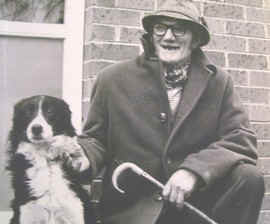 According to
MORE TH>N pet insurance, men aren't just upset by the
loss of a pet, 13% of them take a week or more off work if their pet is lost or stolen.
Notably, that compares to just 5% of women who have taken that much time
off work to get over the upset caused by a pet going missing or being stolen.
According to the company, men are also more likely to cancel social
engagements if a pet goes missing (15%) compared to women (12%).
In addition, men are prepared to spend more trying to find their pet than
women, with almost 20% prepared to spend between £100 and £1000 for the safe return of an
animal, compared to 14% of women.
Chartered psychologist, Beverly Stone said: "These findings
highlight the inherent differences between men and women. Whereas women tend to fear for the
potential loss of their pet when it goes missing and mourns the loss if their pet dies, a man not
only experiences a similar fear and mourning but may also feel a strong sense of responsibility.
"As a consequence, they are likely to feel that they have failed to protect their pet. Men
need more time to get over the guilt, and they would not want to be exposed to people asking what
happened in social events, if they feel responsible''.
|
Why did the chicken cross the road?
- to help its friend apparently...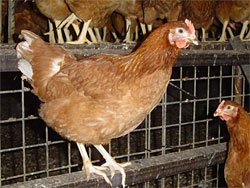 A new study carried out by academics at the University of Bristol's Animal Welfare
and Behaviour research group has revealed that chickens empathise. So, if you've
wondered why the chicken crossed the road, it was probably to help a friend.
More specifically, the research - funded by the BBSRC Animal Welfare
Initiative and published online in the Proceedings of the Royal Society B. - demonstrated that domestic hens
show a clear physiological and behavioural response when their chicks are mildly distressed.
Researchers say the study is the first to demonstrate that birds possess
one of the important attributes that underpins empathy, and the first study to use both
behavioural and physiological methods to measure these traits in birds.
During one of the controlled procedures, when the chicks were exposed to
a puff of air, the hens' heart rate increased and eye temperature decreased. The hens also changed
their behaviour, and reacted with increased alertness, decreased preening and increased
vocalisations directed to their chicks.
Some of these responses have previously been used as indicators of an
emotional response in animals. In domestic chickens, time spent standing alert is associated with
higher levels of fear. Previous research carried out by the same group has shown that hens
also selectively avoid surroundings associated with high levels of standing and low levels of
preening.
Jo Edgar, PhD student in the School of Veterinary Sciences, said:
"The extent to which animals are affected by the distress of others is of high relevance to
the welfare of farm and laboratory animals.
"Our research has addressed the fundamental question of whether
birds have the capacity to show empathic responses.
"We found that adult female birds possess at least one of the
essential underpinning attributes of 'empathy'; the ability to be affected by, and share, the
emotional state of another."
The researchers say they used chickens as a model species because, under
commercial conditions, chickens will regularly encounter other chickens showing signs of pain or
distress due to routine husbandry practices or because of the high levels of conditions such as
bone fractures or leg disorders.
|
European tick established in the UK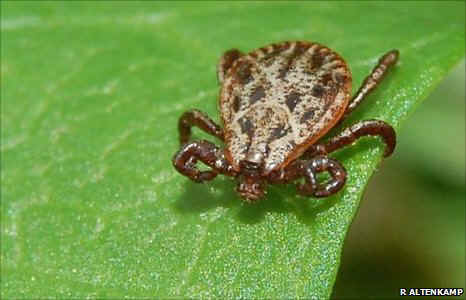 A species of blood-sucking tick native
to continental Europe has become established in the UK, scientists say.
Researchers found five European meadow ticks in south-east England and
west Wales during a search of the UK's dogs. This involved 173 veterinary practices, which
collectively checked more than 3,500 dogs and sent any ticks they found to a lab for
identification.
The species is known to carry tick-borne infections that are not yet
found in this country.
Faith Smith from the University of Bristol led the study, which was
published in the journal Medical and Veterinary Entomology. "We asked the vets to
check dogs totally at random; to check any dog coming in for any reason," she told the BBC.
Gundogs, terriers and pastoral breed groups were most susceptible to
picking up ticks, which often wait in long grass for animals to brush past. Longer-haired dogs
were also more susceptible.
Disease
The researchers think a changing climate and "increased global
movement of people and companion animals" have assisted the spread of ticks.
"Studies have been done to show that the distribution of Ixodes
ricinus (the sheep tick) has shifted northwards in continental Europe in the past few decades, and
that the species has been found at higher altitudes," said Miss Smith.
"So it is possible that climate change will affect certain species
of ticks."
There is concern that the European species could spread infections that
do not currently occur in the UK, including tick-borne encephalitis.
"The longer the tick is on, the higher the chance of a tick-borne
disease," said Miss Smith. "Ticks don't actually start to transmit infections until
24-48 hours post attachment. So the sooner it is removed cleanly, the smaller the risk of getting
a disease it might be carrying."
|
| According to Petplan:
Vets are
trusted more than the police!
Research shows that an enormous 98% of Petplan
customers trust their vet, with many saying they are more trustworthy than police officers -
coming second only to doctors. 42% of customers refer to their vets by their first name, and 47%
have his/her mobile number saved on speed dial. This data seems to make vets the unofficial 4th
emergency services!
11 million British households own a pet and 62% of these are registered to a veterinary practice.
With Petplan receiving an average of 10,000 claims each week, vets are busier than ever and
are fast becoming a pet owner's best friend.
|
| This little piggy went to market,
this little piggy stayed at home....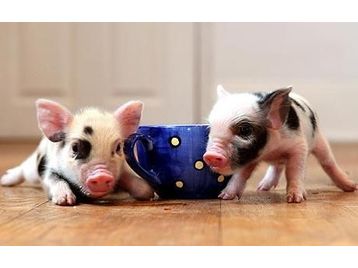
With their tiny trotters and adorable little snouts, it's no wonder micro
pigs have become the new must-have pet. But what is the reality of keeping these little
snorters? In the eyes of the law these pets are still considered to be livestock and, as
such, there are legal requirements to owning one.
- In order to keep a pig (albeit a very little one!) owners must have a
Country Parish Holding (CPH) number which is needed in case of a disease outbreak.
- If you wish to take your little piggy out for a walk then you will need a
walking licence
- It is illegal to feed pigs certain processed food and scraps from the
kitchen - and, apparently, if you overfeed them then they grow and are no longer micro!!!
- Their skin, tusks, hooves, eyes and ears have to be carefully maintained
- You can't take your little pig along to see Pat at Churnet Vets as they come
under the remit of large animal vets (a good reason for not having one)
Basically, if you keep a micropig then you are actually keeping a farm
animal in your home, one that is not domesticated, so think carefully before you let your heart
rule your head!
|
| The RSPCA has reported a dramatic
increase in the number of cats being abandoned. 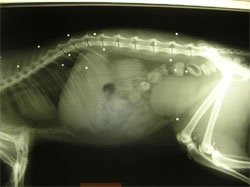
The number of abandonments reported to the RSPCA was 10,610 in 2010,
a 28% increase on the number reported in 2009 (8,310), and a 40% increase on the number in 2008
(7,609).
The charity received 205 reports of cats being shot in 2010, more or
less the same as the year before. However, the charity says anecdotal reports suggest the
number of cats being attacked (including being set upon by dogs or thrown from buildings) is
increasing.
RSPCA chief veterinary officer, Alastair Macmillan, said: "The
news of massive rises in abandonments and other attacks is alarming and shows a frightening trend
in cat abuse and neglect. We don't know why we are seeing such increases and hope that people
are not starting to see cats as worthless things which can be targeted with weapons or just dumped
when people don't want to care for them anymore".
|
| Do you know who was the
"inventor" of veterinary science? It's
probably something not many of us have ever given any thought to, but apparently it was Claude Bourgelat was the son of a distinguished
citizen of Lyon, along with Henri-Leonard Bertin.
In 1761 Louis XV wanted to promote the prevention of
cattle disease, the protection of grazing land and training of farmers, he put his Controller
General of Finance in charge of this, and in turn he proposed that a veterinary school
should be founded in Lyon and the director should be Bourgelat.


Oh La La!
|
 Veterinary Medicine celebrates its 250 year anniversary!
The European Commission (EC) and the World Organisation for Animal Health (OIE) launch the
“Vets in your daily life” campaign that celebrates the 250th anniversary of the creation
of the veterinary profession.
As part of the campaign a series of events will unfold throughout 2011, declared World Veterinary
Year for the occasion, to increase knowledge about the multifaceted work of veterinarians.
“Everybody knows veterinarians as animal doctors, but few know that they truly play a pivotal
role in the prevention and control of infectious animal diseases, including those transmissible to
humans, animal welfare, food production or food safety. World Veterinary Year 2011 is a very
special opportunity to celebrate the daily contribution of veterinarians to the civil society, as
a global public good”, said Dr Bernard Vallat, OIE Director General.
World Veterinary Year (Vet 2011) is off to a
fantastic start in the UK with the recognition of three veterinary surgeons in the New Year’s
Honours.
Dr Lydia Akrigg Brown, President of the
Veterinary Benevolent Fund has been awarded an MBE for services to the veterinary profession;
Lewis George Grant, former veterinary manager
in the Meat Hygiene Service, Food Standards Agency and animal welfare representative of the Veterinary
Public Health Association (VPHA) has also been awarded an MBE;
Professor Quintin McKellar, Principal of the
Royal Veterinary College has been awarded a CBE for services to science;
BVA Honorary Member the Earl of Selborne was
also recognised with a GBE for services to science.
These honours recognise the enormous breadth of work undertaken by vets in the service of the
country. It is this work that World Veterinary Year 2011 seeks to celebrate and publicise across
the globe.
Here in the UK the BVA will be working with its divisions and the RCVS to mark Vet 2011 by
championing the achievements of the veterinary profession.
|
Cat owners 'more
educated than dog owners'
Cats have long been thought to be cleverer than dogs - and
now it seems the same is true of their owners.
People with cats are more likely to have university
degrees than those with dogs, according to a scientific survey of pet ownership. The study
also revealed that the combined cat and dog population of Britain is more than 20.8 million - 50
per cent higher than previously thought.
Researchers at the University of Bristol say that the
superior intelligence of cat owners is unlikely to be caused by their exposure to the famously
cunning and selfish pets. Rather, more educated people tend to work longer hours and choose
a pet to fit their lifestyles. Unlike dogs, cats require no walking and can manage with little
human company.
Dr Jane Murray, Cats Protection Lecturer in Feline
Epidemiology, who led the study, said: "We don't think it is associated with income because
that was one of the variables we looked at, and there was little difference.
"Cats require less time per day than a dog, so they
are more popular with educated people who work late and have long commutes."
Homes with degree-holders were 1.36 times more likely to
have a cat than other households. The same homes were less likely to have a dog than households
where no-one went to university.
The study, published in the Veterinary Record journal,
also found that cat owners were more likely to be older and female. Both cat and dog owners were
more likely than the general population to live in households with gardens in rural areas.
The popular myth of cat intelligence was dented last year
with the publication of a study showing that they did worse than dogs at a simple reasoning task.
Cats presented with two pieces of string, only one of which was attached to a food reward, could
not tell which one to pull for their treat.
|
Overwhelming
support for deed not breed in dangerous dogs consultation
November 2010
The government has published the results of the Defra
consultation on dangerous dogs revealing overwhelming support for an overhaul of the failed
Dangerous Dogs Act 1991.
The consultation closed in June and the British Veterinary
Association (BVA) and British Small Animal Veterinary Association (BSAVA) submitted a joint
response based on sound scientific evidence and expert veterinary opinion. The response called for
an end to breed-specific legislation that targets dogs based on the way they look rather than
their actions.
The BVA and BSAVA are delighted with the summary of the
4,250 responses published today that reveals:
- 88% of respondents do not believe that current
legislation is effective in protecting the public;
- 71% believe that breed-specific legislation should be repealed;
- 84% are in favour of all dogs being microchipped.
Commenting, Harvey Locke, President of the BVA, said:
"There is enormous support amongst experts in dog
health and welfare for an end to the failed breed-specific legislation.
"The Coalition Government's programme promised to
take action on dangerous dogs and Ministers must now take on board the strong views from this
consultation to implement changes.
"The problems caused by dangerous dogs impact on
public safety and animal welfare and maintaining the status quo is not an option."
Grant Petrie, President of BSAVA, added:
"The problem of dangerous dogs will not be solved
until the government accepts that the Dangerous Dogs Act has failed. This view is supported by the
thousands of responses to the consultation.
"The support for repeal of the Act and for compulsory
microchipping of dogs are clear and we look forward to hearing Defra's plans in the New
Year."
|
A
message from Petplan....
With parts of the UK being hit with historic low
temperatures, and with more snow and ice on the way, it’s worth sparing a thought for our
furry friends.
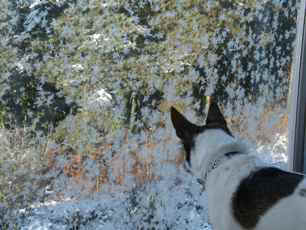
The early arrival of winter poses serious risks to our beloved pets, and pet owners are encouraged
to be extra vigilant in the freezing weather.
Petplan’s Vet of the Year, Ben Jones, believes that our pets are potentially in more danger
in the cold weather, and being more aware can help prevent potential tragedies.
Ben’s top tips this winter are:
If you can't get out with your dog because of the cold
weather, then try to ensure you have plenty of toys, especially activity types, to keep them active.
If the pavements are gritted, check your dog’s paws
to make sure they aren’t starting to hurt. Grit can be extremely irritating to footpads, even
drying them to a point where paws split open and bleed. Dogs will also lick off road salt and this can
cause stomach problems.
Don't allow pets on frozen ponds/canals for obvious
reasons.
Try to ensure that all aged/debilitated animals do not get
cold overnight, by providing extra warm blankets and bedding.
Animals with arthritis are at greater risk and may suffer
more in the cold. Keep them warm at all times.
Greater care should be taken if you have outside water bowls. Make sure they are not frozen after
leaving them for a long period of time.
For rabbits make sure you have made all hutches
draught-proof with plenty of warm bedding.
Keep your pets off areas where there is ice just like us
it’s easy for them to slip and injure themselves.
Most brands of anti-freeze contain ethylene glycol which
tempts pets with its sweet smell and appealing taste. Unfortunately, it is also extremely poisonous.
Dangers occur from spillages when topping up the car, bottles being left open or with loose caps that
could be tipped over and lapped up.
Dog owner, Helen Stone from Reading, agrees that it is
important for owners to take extra care of their pets in the cold weather as she has first hand
experience of the dangers. When George, her pet poodle, was outside for some air and a run-around
the ten year old poodle slipped on ice and crashed into a set of French doors. George was
immediately admitted to hospital for internal bleeding and had to undergo surgery to repair a
snapped spinal cord and have a disc removed from his spine.
Helen said, “George spent three weeks in hospital and has regular visits from a
physiotherapist to help him learn to walk again. I couldn’t believe how badly he had been
hurt just from a slip in the garden. Thank goodness George was insured otherwise I’m not sure
George’s recovery would have been possible, and he may not have survived. It was very
scary.”
Petplan, the UK’s favourite insurer, has so far paid out
over £5,600 to help get George back to full health.
|
| Psychology researchers at Lincoln
University are looking for 200 dog-owning familes in the East Midlands with one or more
children aged three to six to participate in a new bite prevention study. Participating families will be asked to use interactive software to teach children
how to stay safe around dogs. The Blue Dog CD features a series of animated situations and
games involving a dog and a child, offering safe and unsafe outcomes. Parents will be asked
to fill in a questionnaire and then film their child interacting with their pet dog at a few
intervals over the course of a year.
For more details on the two year study, or to express an interest in
taking part, visit
www.lincoln.ac.uk/psychology/blue_dog.htm
Pet People - magazine from Petplan , winter 2010
|
Curiosity killed the dog?
Not many of us know that a life threatening
lungworm, Angiostrongylus vasorum, is carried by 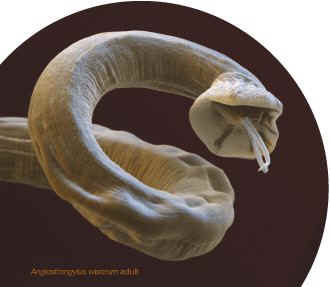 slugs
and snails. If your dog swallows one of these common garden visitors there is a risk it
could become infected. slugs
and snails. If your dog swallows one of these common garden visitors there is a risk it
could become infected.
The lungworm Angiostrongylus
vasorum (also known as French Heartworm) is a parasite that infects dogs. The adult
of this particular lungworm lives in the heart and major blood vessels supplying the lungs, where
it can cause a host of problems. Left untreated, the infection can often be fatal.
Ask us about a spot-on treatment which used monthly will
prevent infection with this parasite.
www.lungworm.co.uk
|
| The Dog Control Bill Key veterinary and welfare organisations are supporting a private member's bill
designed to replace the Dangerous Dogs Act 1991. Called the Dog Control Bill,
it is wending its way through the labyrinth of the three House of Lords readings and a committee
stage before it arrives in the House of Commons.
The Dogs Trust veterinary director, Chris Laurence, stated "The Dog
Control Bill supports the principle that it is people not the dogs themselves that make dogs
dangerous. Lord Redesdale's bill would allow people to be better protected from dangerous
dogs, with toucher action take agains irresponsible dog owners"
This bill aims to shift the emphasis from targetting specific breeds to
the actions of individual dogs and owners - "deed not breed". The bill, introduced
by Lord Redesdale, includes the introduction of dog control notices, which would be issued when
dogs act dangerously without provocation, causing an injury to a person or an animal, or even if a
person just felt that they were going to be harmed. When issued with a notice the dog would
be microchipped and the owner would face anything from a fine to a jail sentence depending on the
severity of the incident. If appropriate the dog would then be monitored, and compulsory dog
training for the owner is a possibility.
Watch this space...
Veterinary Times July 10
|
The Feline
Advisory Bureau's (FAB) WellCat for Life programme classifies older cats as:
"mature" when they are 7 - 10 years old (equated
to a 44 to 56 year old human
"senior" when they are 11 - 14 years old
(equated to a 60 to 72 year old human)
"geriatric" when they are 15 years or older
(equated to a human aged 76 years or older)
www.fabcats.org
|
Holiday Blues
A study conducted by CEVA Animal Health found that an
estimated half million British dog and cat owners never go on holiday for fear of upsetting the
routine of their pets.
The study surveyed 1,100 cat and dog owners. They
found that over half of the owners who did go on holiday without their pets felt guilty about
leaving them in a kennel or cattery. The survey also found that 63% of owners claimed they
noticed a change in their pet's behaviour when they returned home, including the animal suffering
from nervousness and confusion.
CEVA Animal Health, June 2010
|
|
|
|
|
|
|